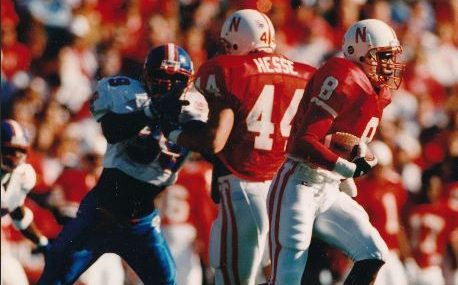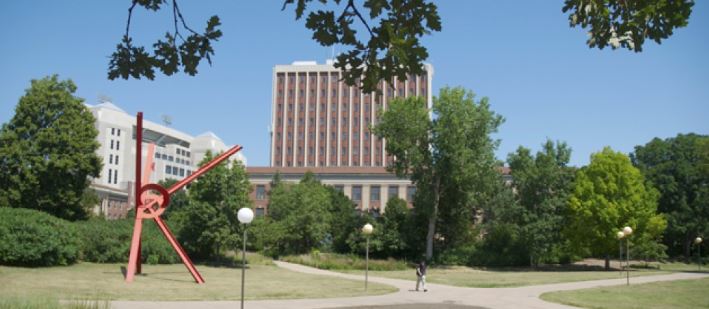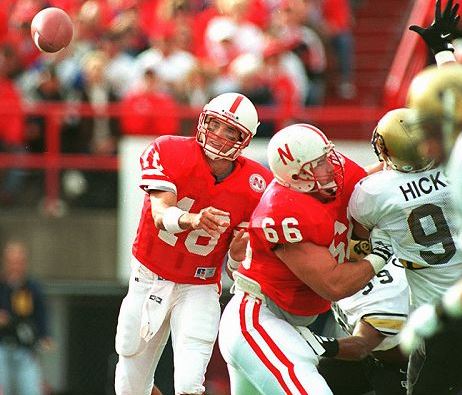Anatomy of an Era: Jacques Allen, Part 2

Excerpted from Chapter 68, No Place Like Nebraska: Anatomy of an Era, Vol. 2 by Paul Koch
Anatomy of an Era: Jacques Allen, Part 2
Q: Any other comedy bits that you were known by in those days? Any other one-liners worth sharing?
Jacques Allen: I used to do impressions. I used to do skits before meetings, stand up in front before team meetings and do ‘Fire Marshal Bill’. Me and Aaron Davis used to laugh. We were all cracking up, man. ”Let me tell you somethin’….” (laughing) That was really one of the times me and Coach Brown really got along. Coach Brown would be like, “Jacques, do that one again.” That’s what I did, I kept it fun.
Q: I was talking to Troy Dumas recently and he brought up something I wasn’t aware of as it came to unity and a great bond there. He thought one of the things that really helped was the big fight that you guys had when you were freshmen. Remember that?
JA: Oh, yeah. I remember that like it was yesterday. Do you remember that group that called themselves ‘The Lincolnites’? A lot were originally from Mississippi and Alabama and moved to Lincoln and were always mad at the football players, because they said that we always took the women from them. The older players were telling us, “You guys don’t go to the Cherry Hut, don’t go to the Underground, don’t go to this or that place. Go to this place…”
And our freshman class, as diverse as it was, was like, “You mean these guys have done enough to you that you feel you can’t go to these places?” Our freshman class was like, “We don’t care what you say. We want to go to these places and hang out, and that’s where we’re going.” So one night some of them had gone out and some of us were at the dorm, and I was one of them. And I got a phone call and someone was like, “Jacques, these dudes are following us back to the dorms.” So I go around and starting knocking on doors and said, ‘Hey, get downstairs. The Lincolnites are following such and such back to the dorms!’ So we get downstairs and it was crazy. It was huge.
And our freshman class was so tight. We used to walk together everywhere. Not drive. Walk. I mean, we would walk miles together. We were tight, man. That’s what differentiated our class. And our class wasn’t ranked very high in the recruiting world. We were ranked between like 38th and 50-something. And we took it upon ourselves. We couldn’t believe these older players were scared to actually go places. And we were like, “We don’t care what you say. Nobody tells us where we can go.” And I can remember this: there would be 25 to 26 deep at times, us guys walking around everywhere, we were close. I’m talking Christian Peter, I’m talking Ken Bello, Troy, Abdul, me, Dwayne Harris, Ralph Lott, Doug Colman, all of us, Sedric Collins, Reggie Baul, Ron Samuels (Tony’s nephew, from Upland, California). Our whole group was just very tight. The older players almost looked up to us. It was like, “Hey, they won’t sit with us.“ They were like, “You guys are crazy.” And I remember thinking, ‘You guys let this go on for years and years and years, and we’re not putting up with that. This stuff has to stop. We have earned the right to be here. And if the only thing you (Lincolnites) can think of fighting us for is the women, then so be it, but you can’t tell us where we can and can’t go.’ And Coach Osborne didn’t necessarily hear that, but that was our mentality.

Q: So the Lincolnites followed them back to the dorms?
JA: Oh yeah, they were followed back to the dorms and they called us. That was back in the day they had those big, old-school cell phones. They must have weighed about 80 pounds. (laughs) And I went around and started knocking on doors, ‘Hey, we have to get downstairs!’ That was our defining moment for our freshman class. It brought us really close.
Q: What’s the correct term for what you did to them?
JA: “Worked them over?” Oh yeah, we did that.
Q: Was there much tension, then, with these guys the whole time you were there at Nebraska?
JA: It was all throughout. That thing that happened with Riley? That happened with Abdul? It was the same group of people that would cause problems for us. Paul, a lot of people won’t admit it -but some of us?- we fought them all throughout our college careers.
Q: Knowing how you guys could get your names in the paper and they wouldn’t…
JA: Oh yeah, Tom Osborne would ask (the police) the same questions, “Were such and such there? Where’s the other party?”, you know? We didn’t look for trouble, Paul, but we would defend ourselves.
And that’s another thing that differentiated our class from the other ones was that we did stand up for ourselves. And even though Tom would tell us not to go somewhere, that’s just how we were. We were the first class that was actually like that, “Enough is enough.” The way we felt was that was the reason Tom Osborne said not to go to these places, was the players would go to Tom and say that some things happened at these places. And us guys, a lot of us came from backgrounds where we’d go, “Well hell, that’s nothing. We’re used to that. That ain’t nothing new. We like going to those places, truth be told. So we’re going.”
Q: You guys were a little hard-headed, then?
JA: Yeah, we were renegades. You remember this also, my freshman class’s first semester had the lowest GPA in the history of Nebraska Football. That Nebraska winter is nothing to be played with, and even though a lot of us were from the Midwest and from the mountains, it was cold out there. The wind is something fierce. I remember Troy was my roommate, and Troy would be like, “Jacques, are we going to class today?” I’d put my hand on the window -which was freezing- and be like, “No, we aren’t going to class today.”
But do you know what we would do, Paul? We’d still go down to the Rec Center before practice and still play basketball before meetings. The freshman class? That was the reason we had the Unity Council. (laughs) Our class was the reason we had the Unity Council.
Q: T.O.’s way of straightening you guys up a little bit, huh?
JA: Right. We’re the reason people like Keith Zimmer and Dennis Leblanc were checking class. We even had a method for that. They’d come in and take roll for class -and a lot of us had class together- and as soon as they would leave we’d wait ten minutes and we’d all start leaving class. (laughs) We’d go play basketball until 3 o’clock, because that’s when we’d have to be in meetings.

Available on Amazon.com
Q: Do you think the coaches knew the extent of the renegades they recruited in your class? Do you think they were aware of that from the start?
JA: I’d say ‘yes’, and the reason I say that is, I think we were all ‘diamonds in the rough.’ A lot of us had come from high schools where we’d been taken care of and things always worked out our way and we never had to answer to anything, but I think we were talented and they took that on as a challenge itself, also because they knew we were special. I really, truly believe that. I think they believed we were special and I remember that loss to Florida State. Our freshman class said, “We’re not losing anymore. We’re not losing anymore. That hurts us. We’re not losing anymore.“ And I think the coaches believed that.
And even in ’93 we had the national championship as our goal. I truly believe when we beat Miami, I think everybody, the coaches, honestly believed, “That’s what we’re going to do.” I think in ’94 our coaches knew we were not going to lose, we were going to hit that goal. And ’95, too. And if there would have been a goal after winning the national championship, I think we would have achieved that, too.
Q: So tell me about Coach Ron Brown, your position coach.
JA: He’s a great receivers coach, I’ll say that. Me personally, I respect him as a coach, and I’ll leave it at that. Me and him didn’t see eye-to-eye on a lot of things, but he’s a great coach and he played who he felt he needed to play, and I respect that from him being a coach.
Q: And other than bothering Coach Osborne, do you have any memorable thoughts about him?
JA: The thing I remember the most about Coach Osborne was he always told me how much he appreciated my effort. Him and Coach McBride and Coach Darlington would always tell me, “We could give you the Scout Team plaque every week.” I took a lot of pride in that, especially when I had to accept the fact that my dreams weren’t going to happen on that level. So I had to find different ways to fulfill my needs and make it enjoyable.
Q: Still find a way to contribute even if you didn’t get on the field come game time?
JA: Yes, and the other coaches respected and acknowledged that. Them saying that they could give me that Scout Team Award every week? That meant a lot. I wasn’t a starter, but they couldn’t say that it was ever for a lack of effort. And I really appreciated that and it made it all worth it, because the team knew what I was doing. They would hate to compete against me because I am a competitor at heart, and “if my coach doesn’t want to see it then I’ll show other people.”
I remember Coach Darlington always used to talk to Coach Brown, “Are you mad at him? What did he do? He’s tearing us up down here!” That used to make me feel good. Even if it’s not coming from my own coach, somebody is seeing the work that I’m doing and how seriously I took it. I may not have been in any of the magazines and this or that, but my teammates and other coaches saw my effort and that made me feel really good.
Q: Anything else you recall about Charlie McBride or Coach Darlington from those days?
JA: Well, they used to tell me, “We’re really counting on you giving us a full effort this week. They’re a team we don’t know much about, so it’s really important you give us the best picture possible.” And there would be times I was not only playing wide receiver, I was playing tailback or tight end. They would put me in places where they needed to get a picture of what a fellow looked like.
One week I remember in particular was ’93 and Trev Alberts was still there, we were running a reverse play and I was playing tight end. The play was: I’m on the right side and I blocked down on the defensive tackle, and then come off him and kind of do like a circle. So Trev sees the reverse is coming his way and he sees me go down, so he’s just sitting there in space like, “I see this coming. This is wide open.” So I see him coming, he’s got a wide open shot on the receiver coming from the other way… and I just lay him out. (laughs) And then Trev gets up and was like, “You were the tight end, weren’t ya?” (laughs)
I just have a lot of pride in my class, because I think we really stepped it up and helped take it to the next level that Coach Osborne had always dreamed about. I think that we offered him that. And him as well, to us, because he put a lot of faith in us, also.
Q: And it wasn’t just talk, you guys put it to action out on the field, too..
JA: Right, everything was serious. Like I said, practices were games, too, Paul. We took it very seriously. I was talking smack all throughout practice. I was like, ‘Oh, you guys suck! We’re gonna get our ass kicked this week.’
Q: I’m sure the Blackshirts didn’t appreciate that very much…
JA: Oh, I didn’t care. I still wanted to score. You can ask anybody, after scoring I’d take the ball and throw it out of the stadium and into the stands. (laughs) We were starting to run out of footballs, you know? (laughing) Those student managers were, “Jacques, will you please stop throwing the balls up into the stands? Please stop throwing the ball out into the street?!” We had fun.
Q: So your junior and senior year, you found a way to get on the field?
JA: Yeah, as a senior I made the travel squad and got to get into the games and had a lot of time. That made it special, playing Missouri. So I did get to fill a void playing my senior year. But it was a great experience. I wouldn’t trade it for the world.

Q: Do you have a favorite or most memorable play you were involved in?
JA: Yeah, I think it was the Missouri game and Brook (Berringer) was playing quarterback and we were running a bootleg, and I was running a drag across the field, and I put my hand out like, ‘Brook, I’m open! I’m open!’ Of course, he sees me, but by the time he throws it I’m out of bounds. But I caught it one-handed.
I’d do those catches all the time. It was cool. I was out of bounds, but it was cool because the fans got to see what I did every day at practice.
Q: Any recollections of running out of that tunnel? What that did for you?
JA: Oh, it was the greatest ever. You know, a lot of these teams, they come out and they hold hands or lock elbows? We already had that. But we didn’t need to do that, just hearing the music and the crowd going nuts. They weren’t even goosebumps anymore, they were pterodactyl bumps! I can’t even really explain it to you, but everybody felt that way, even if someone knew they weren’t going to play a lot in that game, because everyone took their job seriously, knowing they contributed, and everybody felt they were a part of that.
And I don’t think every other player at other universities could say that. But we could say that, because we had the opportunity to be out there on the sidelines. And the thing is, we earned the spot to be here.
Q: It’s not just that you showed up and put the uniform on, you’d earned it?
JA: Yes. And I’ve got a million practice stories. Go back to Tempe, and something happened with my helmet, the snap had broken off on one of my ear pads and they were, “Jacques, you’re going to have to sit out a few plays so we can work on your helmet.” And I was like, ‘I don’t need no helmet!’ And so I went out there full-contact, we’re in full pads, and I’m still scoring touchdowns with no helmet on. You know, this just goes to show you how serious I took being out there. It’s funny, it could have really gotten torn up out there besides a helmet to the head. But I just loved being out on that field.
Q: Jacques, you were so fast there’s no way they would have caught you, anyway! (laughs)
JA: (laughing) You know, you’ve got a point there. Michel Booker and Tyrone Williams were like, “You know, you don’t look that fast, but you are fast! And you can catch.” I had a lot of fun. And I felt like, ‘Hey, I’m just trying to make you all better, man.’
Q: In the end, did they appreciate that?
JA: Yes. Here it is, it’s fifteen years later and these guys still talk about that, and it means a lot to me. It means a hell of a lot to me. Those guys going to the next level, and they’ll still tell you “Jacques Allen was still one of the best receivers I went up against.” (laughs)
To be continued….
Copyright @ 2013 Thermopylae Press. All Rights Reserved.
Photo Credits : Unknown Original Sources/Updates Welcomed
Author assumes no responsibility for interviewee errors or misstatements of fact.